
When Utah's Cold Strikes: Why Emergency Heating Repair Matters
Emergency heating repair utah is a critical need when winter temperatures plummet and your system fails. A heating breakdown in Utah's harsh winters is more than an inconvenience; it's an emergency that can threaten your family's safety and comfort.
If you need emergency heating repair in Utah, call immediately for these issues:
- Complete system failure with no heat.
- Gas odors (evacuate first, call your gas company, then us).
- Carbon monoxide alarm (leave immediately and call 911).
- Burning or electrical smells (turn off the system).
- Loud mechanical noises like grinding, screeching, or banging.
The extreme weather across Utah, from Park City to Salt Lake City, can turn a broken furnace into a crisis, leading to frozen pipes and dangerous living conditions. Understanding what qualifies as an emergency—like gas leaks, CO risks, and total system failure in cold weather—helps you respond safely.
I'm Mike Townsend. My U.S. Army experience with precision cooling systems and leading a veteran-owned HVAC company gives me deep expertise in emergency heating repair utah situations. I know how quickly these emergencies escalate and the precision required to restore safety to your home.
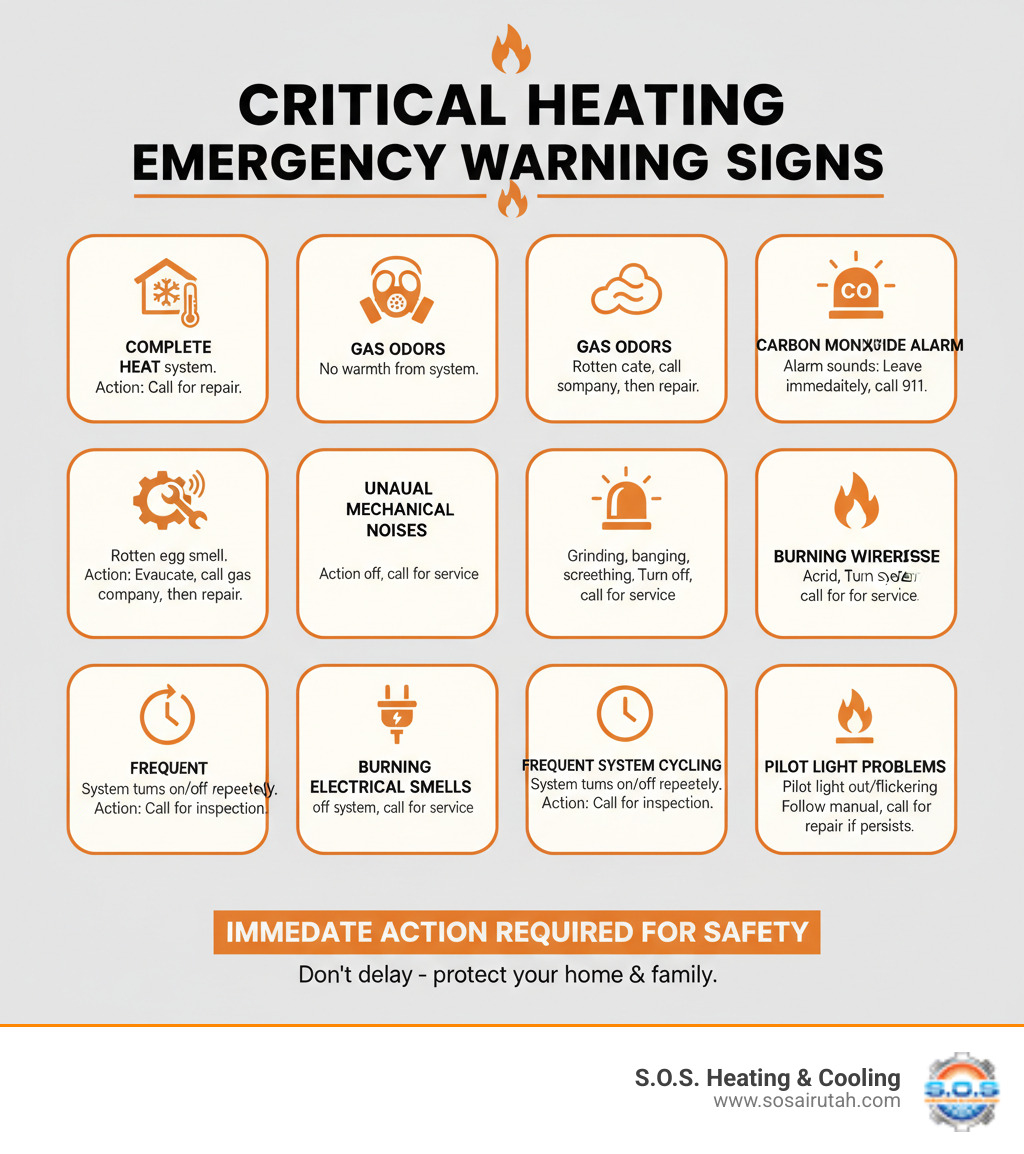
Recognizing a Heating Emergency: Critical Signs You Can't Ignore
Knowing when your heating system needs routine help versus screaming for "emergency heating repair utah" can prevent a dangerous situation.
Complete heat loss is the most obvious red flag. During a Utah winter, a furnace on strike is a serious risk to your family and can lead to frozen pipes. Other signs are more subtle. If your system is blowing cold air, it could indicate pilot light issues, a clogged filter, or problems with the blower motor.
Listen for unusual noises. Grinding, screeching, or banging sounds are cries for help, often indicating failing parts that could cause a total system failure.
Never ignore burning smells. Electrical odors suggest overheating wires—a fire hazard requiring immediate attention. Even more critical is a gas smell (like rotten eggs), which signals a potential gas leak. Your carbon monoxide detector alarm is another non-negotiable emergency signal. This silent, invisible gas is deadly. Also, watch your pilot light; if it won't stay lit or burns an unusual color, you have combustion issues. Finally, frequent cycling (the system turning on and off repeatedly) suggests it's struggling and may break down completely.
What to Do if You Smell Gas
A rotten egg smell means natural gas. Act fast.
- Evacuate immediately. Get everyone out, including pets.
- Do not use electronics inside. A tiny spark from a light switch or phone can ignite the gas.
- Once safely outside, call your gas company first. Their emergency crews will handle the situation.
- After contacting the gas company, call our emergency service team. We can repair your system once the area is declared safe.
Understanding Alarms and Odors
Different warnings require different responses.
- Carbon Monoxide Alarm: Treat this as a life-threatening emergency. Evacuate everyone, call 911 from a safe location, and don't re-enter until cleared by emergency services. Carbon monoxide is invisible and odorless, and exposure can be fatal. You can learn more about the dangers from the CDC.
- Burning Smells: An acrid smell of melting plastic or hot wires indicates an electrical fire hazard. Turn off your system at the thermostat and circuit breaker, then call for emergency heating repair utah.
- Loud Noises: Banging, screeching, or grinding means something is failing internally. Turn off the system to prevent further damage and call for a professional diagnosis.
Common Utah Heating Systems and Their Emergency Failures
Utah's climate puts unique demands on heating systems. Whether in Park City or Salt Lake City, your system works hard. Understanding how the climate impact affects different systems helps you recognize when you need emergency heating repair utah. Most Utah homes use furnaces, heat pumps, boilers, or ductless mini-splits. Each has unique failure signs. Our team has seen every type of heating emergency across the Wasatch Front and knows how Utah's weather affects each system.
Furnace Emergencies
Gas furnaces are common in Utah. When they fail, these are the usual culprits:
- Ignition System Failure: This is a top reason for emergency calls. The furnace has power, but a faulty igniter or pilot light means no heat. A dirty flame sensor can also shut the system down for safety.
- Blower Motor Problems: The furnace may heat up, but a failed blower motor means the warm air goes nowhere. Listen for grinding or squealing noises.
- Cracked Heat Exchanger: This is a major safety hazard. A crack can leak carbon monoxide into your home. If your CO detector goes off or you smell something unusual, this could be the cause.
- Thermostat Malfunction: A faulty thermostat can't communicate with the furnace, preventing it from turning on or causing it to run constantly.
Heat Pump and Boiler Issues
Heat pumps are popular for heating and cooling but face challenges in our cold climate.
- Refrigerant Leaks: Leaks cripple a heat pump's ability to transfer heat. You might see ice on the outdoor unit or feel cold air blowing.
- Defrost Cycle Problems: Heat pumps must melt ice from their outdoor coils. If this system fails during a cold snap, the unit can become encased in ice.
- Frozen Coils: This can happen in extreme cold or with restricted airflow, leaving you with no heat.
Boilers are less common but are found in many Utah homes.
- Boiler Leaks: Water around your boiler is always an emergency. Leaks can cause serious property damage quickly.
- Pressure Loss: Boilers need specific pressure levels to work. If pressure keeps dropping, there's likely a leak or a problem with the expansion tank, resulting in little to no heat.
Your Immediate Action Plan for a Heating System Breakdown
When your heating system quits on a frigid Utah day, don't panic. Follow this action plan to ensure safety first.
If you smell gas, hear a carbon monoxide alarm, or notice burning odors, evacuate immediately and call emergency services. These are not DIY situations.
For less critical issues like loud noises, first turn off the system at the thermostat, then at the main breaker panel. This prevents further damage.
Next, perform a few simple checks before calling for emergency heating repair Utah. Many "emergencies" have simple solutions.
Simple Checks Before You Call
- Check Thermostat Settings: Ensure it's set to "Heat" and the temperature is set higher than the current room temperature. Check for dim or blank displays, which could mean you need a battery replacement.
- Check the Breaker Panel: Look for a tripped breaker. If you find one, flip it fully "off," then back "on." If it trips again immediately, leave it off and call us.
- Inspect the Air Filter: A clogged filter restricts airflow and can cause your system to overheat. If you can't see light through it, replace it.
- Clear Vents: Make sure furniture, rugs, or other items aren't blocking heat registers, as this impedes air circulation.
When Professional Help is Non-Negotiable
If the simple checks don't work, or if you encounter any of the following, it's time to call an expert. These situations require specialized tools and training.
- Gas Odors: A rotten egg smell indicates a gas leak. Evacuate and call your gas company, then us.
- Water Leaks: Water near your boiler or furnace creates electrical hazards and property damage risks.
- Loud Mechanical Noises: Grinding, screeching, or banging sounds signal internal damage that can quickly worsen.
- Electrical Issues: Repeatedly tripped breakers or burning smells require immediate professional attention.
- Carbon Monoxide Alarm: After evacuating and calling 911, you need a professional inspection before using your system again.
- Complete System Failure in Extreme Cold: When temperatures are dangerously low, a lack of heat is an emergency that can't wait.
Don't hesitate to reach out. We provide around-the-clock service because emergencies don't keep business hours.
Emergency HVAC Repair Utah | 24/7 Heating & Cooling by S.O.S. Heating & Cooling
Preparing for Utah's Winter: How to Prevent Heating Emergencies
Nobody wants to deal with a heating emergency when it's 10 degrees outside and snowing. The good news? Most heating emergencies are completely preventable with some smart preparation and regular care.
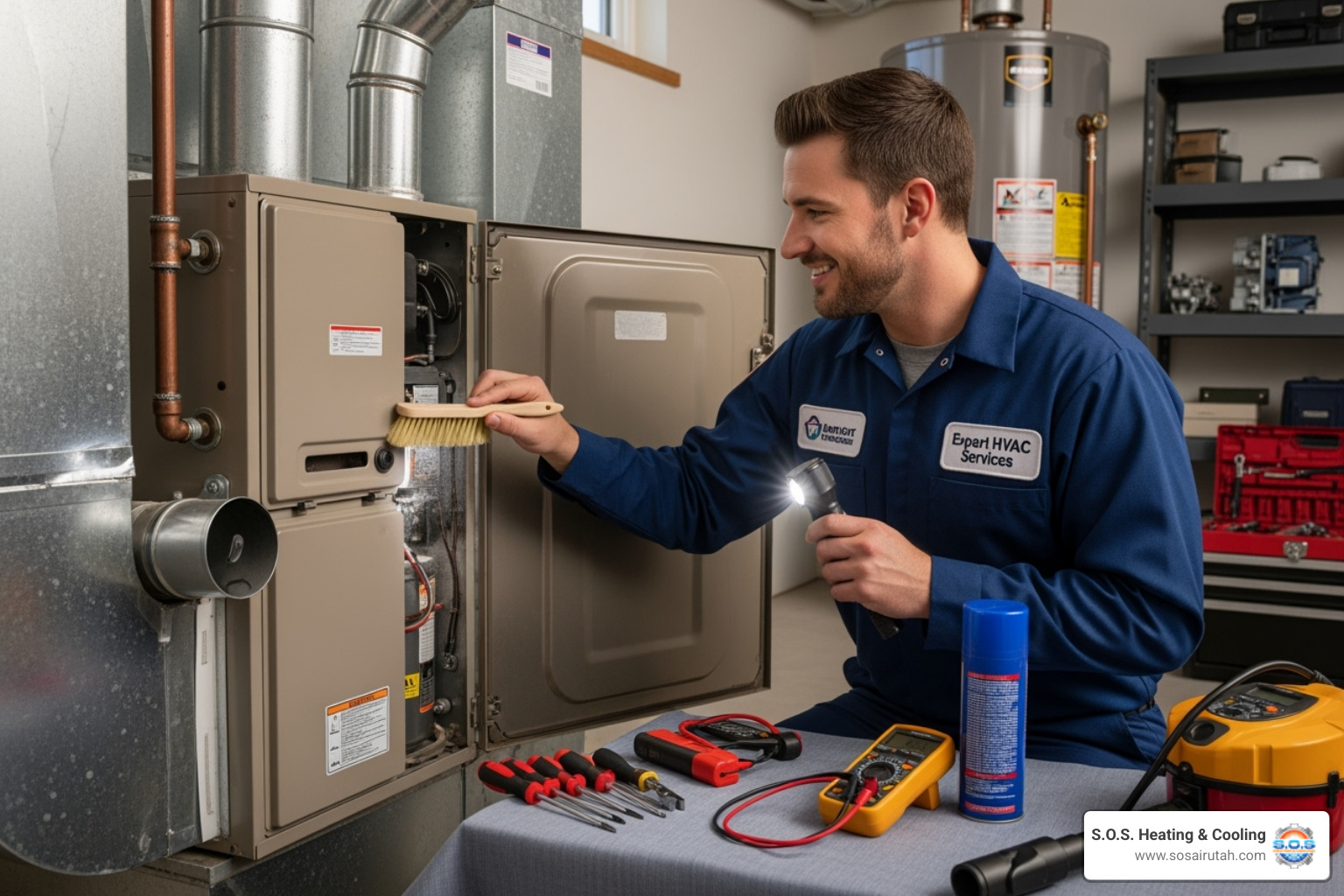
Think of your heating system like your car—it needs regular check-ups. Annual professional tune-ups are the best investment to avoid emergency heating repair Utah situations. Our technicians clean components, check connections, test safety controls, and catch small problems before they become major ones.
Homeowners can also help. Regular filter replacement makes a huge difference. Check your filter monthly and replace it if it's dirty (typically every 1-3 months). Also, ensure you are keeping vents unobstructed by furniture or curtains to allow free airflow.
Your home's envelope is also important. Insulating windows and doors and sealing drafts with weatherstripping keeps heated air inside.
Finally, consider upgrading old systems. A furnace over 15-20 years old is less reliable and efficient. If your system requires frequent repairs or your energy bills are climbing, it might be time for a replacement. A new, efficient system can save you from middle-of-the-night emergency calls. The experts at Energy Star have great guidance on when to replace your furnace.
Creating a Winter-Ready Home
Getting your home ready for winter helps keep you comfortable when temperatures drop.
- Schedule fall maintenance: Service your system before you need it to avoid the rush on the first cold day.
- Check insulation levels: Good insulation in your attic and walls is like wrapping your house in a warm blanket, reducing strain on your heater.
- Seal air leaks: Use caulk and weatherstripping to seal gaps around windows, doors, and pipes.
- Test safety devices: Test your carbon monoxide and smoke detectors monthly and replace their batteries annually.
- Clear your outdoor unit: If you have a heat pump, keep the outdoor unit clear of leaves, snow, and debris for proper airflow.
Choosing the Right 24/7 Emergency Heating Repair Utah Service
When your heat quits in the middle of a frigid Utah night, you need a partner who understands the urgency. Finding the right emergency heating repair Utah service is about more than speed; it's about trust and expertise.
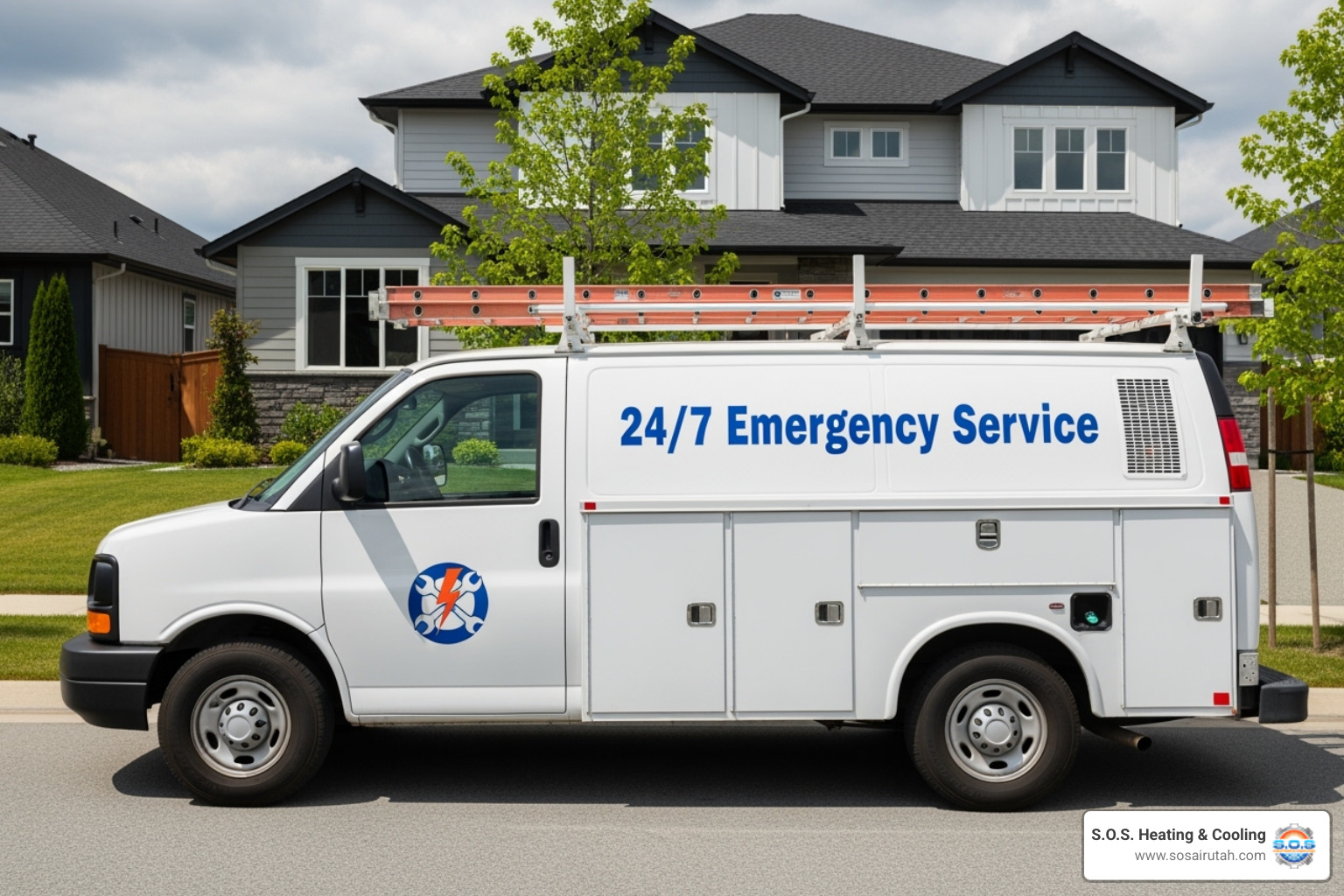
Look for a team that combines these key qualities:
- True 24/7 Availability: This means a skilled technician ready to respond, not an answering service that takes a message.
- Local Utah Knowledge: Our technicians have worked through countless Utah winters, from Salt Lake City inversions to the mountain cold in Kaysville and Bountiful. We know how local climate affects heating systems.
- Rapid Response Time: When temperatures are freezing, every minute counts. Our technicians are positioned throughout the Wasatch Front for quick response to communities like Sandy, Riverton, and Murray.
- Licensed and Experienced Technicians: Your family's safety depends on getting the job right the first time. Our team receives continuous training on the latest technology and safety protocols.
- Positive Customer Reviews: Look for feedback on how a company handles after-hours emergencies and communicates during stressful situations.
- Comprehensive Services: You need a team that can repair any system, whether it's a gas furnace, heat pump, boiler, or ductless mini-split.
The Advantage of Around-the-Clock Service
True 24/7 emergency heating repair Utah service provides invaluable peace of mind. Knowing expert help is just a phone call away transforms a potential disaster into a manageable problem. Furnaces don't break down on a 9-to-5 schedule, which is why after-hours, weekend, and holiday service is essential. During Utah's extreme weather events, a functioning heating system is a matter of safety, preventing frozen pipes and protecting vulnerable family members. At S.O.S. Heating & Cooling, our fully stocked service vehicles and experienced technicians are ready to restore your family's comfort and safety, day or night.
Frequently Asked Questions about Emergency Heating Repair in Utah
When your heat fails on a cold Utah day, you'll have questions. Here are answers to the most common ones we hear.
Why is my furnace blowing cold air?
This common problem has several potential causes.
- Thermostat Settings: First, check that your thermostat is set to "Heat" and the fan is on "Auto." If the fan is set to "On," it will run continuously, even when the furnace isn't heating.
- Clogged Air Filter: A dirty filter can restrict airflow, causing the furnace to overheat and shut down its burners as a safety precaution. The fan may continue to run, circulating unheated air.
- Ignition Problems: If the pilot light is out or the electronic igniter has failed, the furnace cannot produce heat.
If checking the thermostat and filter doesn't solve the issue, it's time to call for emergency heating repair Utah to diagnose the mechanical problem.
What should I do if my carbon monoxide detector goes off?
A CO alarm is a life-threatening emergency. This invisible, odorless gas can be deadly.
- Evacuate immediately. Get everyone, including pets, outside to fresh air.
- Call 911 or your gas company from a safe location.
- Do not go back inside until emergency responders give the all-clear.
After your home is declared safe, schedule an emergency inspection with us. We will find and repair the source of the leak, such as a cracked heat exchanger or blocked vent, before you use your heating system again.
How can I tell if my furnace is too old and needs replacement?
An aging furnace can become unreliable and unsafe. Watch for these signs that it's time to replace rather than repair.
- Age: Most furnaces last 15-20 years. If yours is in or past this range, it's on borrowed time.
- Rising Heating Costs: If your bills are increasing without a change in usage, your furnace is likely losing efficiency.
- Frequent Repairs: If you're calling for service every winter, the cost of repairs can add up. Investing in a new system may be more cost-effective.
- Uneven Heating: If some rooms are always cold, your furnace may no longer be able to heat your home effectively.
- Unusual Noises or Smells: Banging or grinding sounds, as well as strange odors, can signal failing components and safety issues.
If you notice these signs, we can evaluate your system and discuss options for a more reliable, efficient replacement.
Your Partner for Reliable Heating in Utah
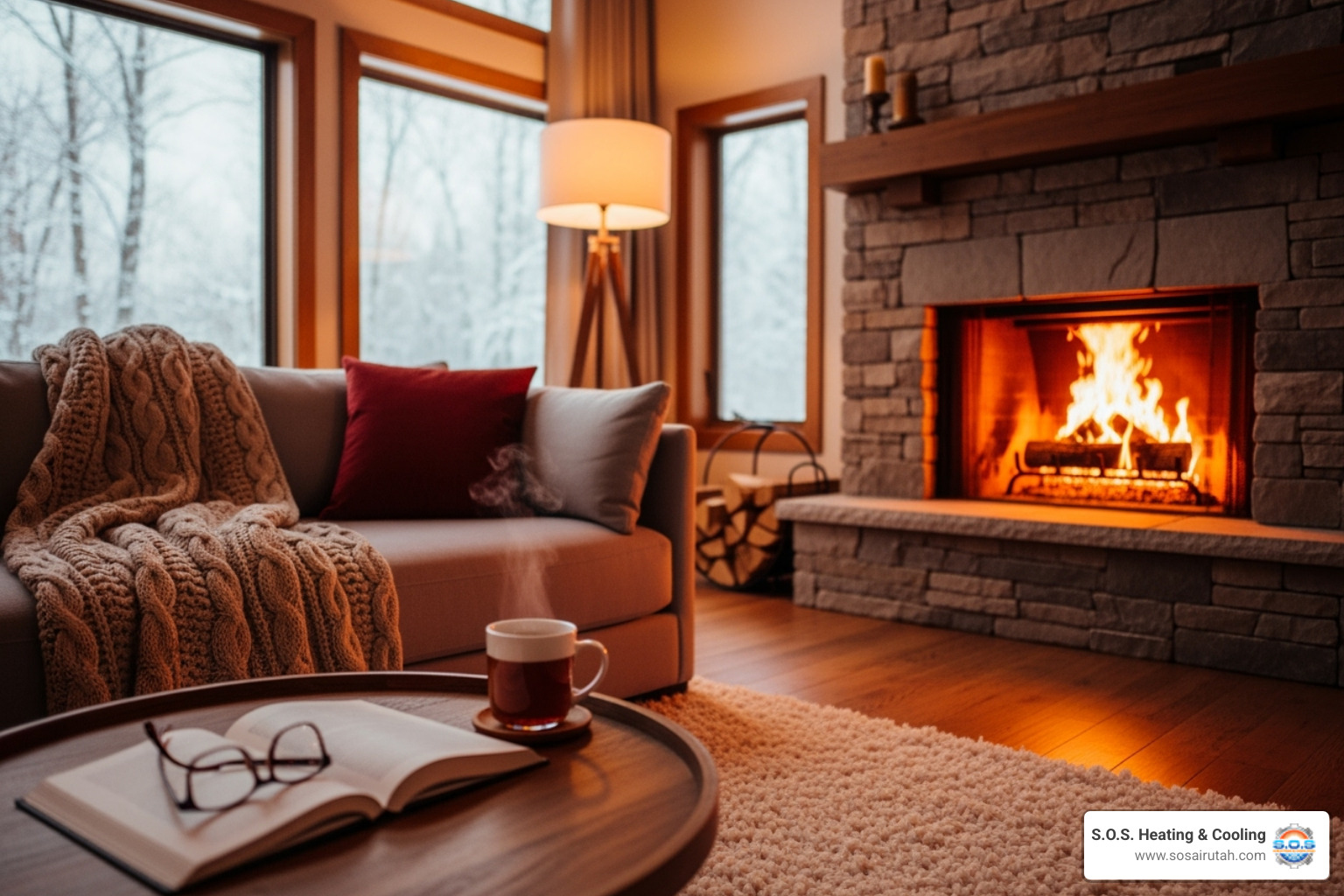
Utah winters are unforgiving when your heating fails. We've covered the critical emergency signs to watch for, from gas smells to CO alarms. Recognizing issues like complete heat loss and unusual noises signals the need for immediate professional help.
Prevention is your best defense. Regular maintenance and simple tasks like changing filters can prevent most heating disasters. But when emergencies happen, the value of 24/7 service is undeniable. You need a team ready to respond instantly, day or night.
At S.O.S. Heating & Cooling, we understand that heating emergencies don't wait for business hours. Our team knows Utah's climate and serves communities throughout Salt Lake City, Kaysville, Woods Cross, Sandy, Riverton, Murray, South Jordan, and Bountiful. We're equipped to handle any furnace or heat pump failure.
Your family's safety is too important to leave to chance. When you need emergency heating repair Utah, you need a partner with rapid response and proven expertise. We're here to keep your home warm and safe, no matter what winter brings.
Get reliable heating services today with S.O.S. Heating & Cooling
Explore Our Latest Insights and Updates in Plumbing Services
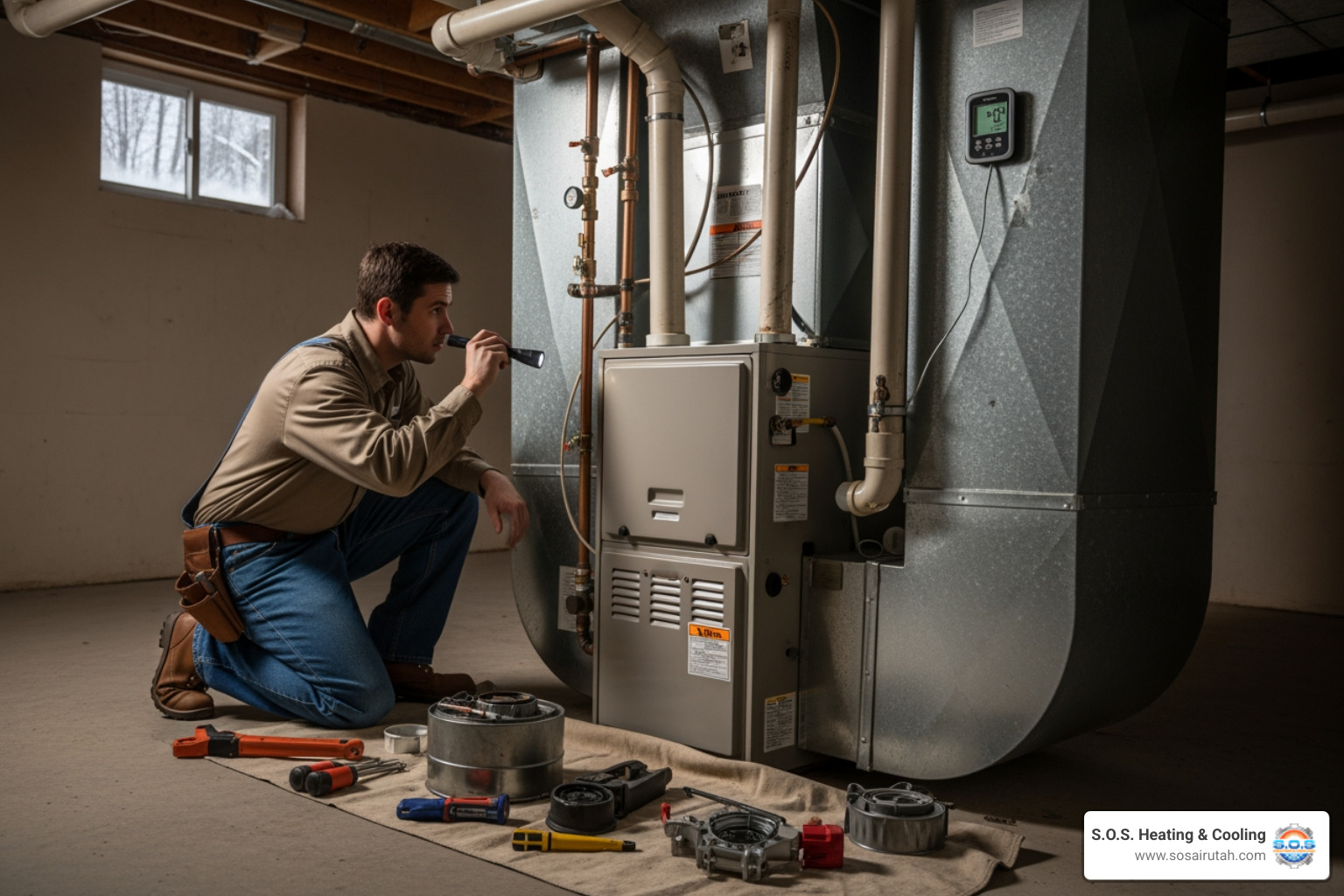
Don't Freeze! How to Get Emergency Furnace Maintenance in Bountiful Fast
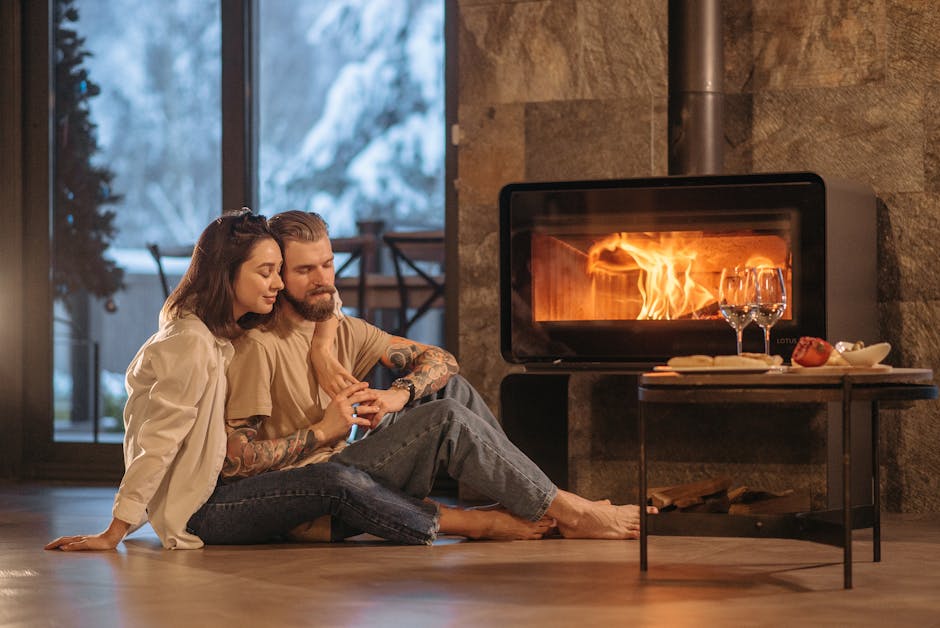
Finding Your Perfect Match: Expert Heating Tune-Ups in SLC

Finding Your Perfect Match: Expert Heating Tune-Ups in SLC


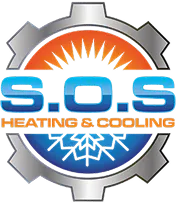



.avif)